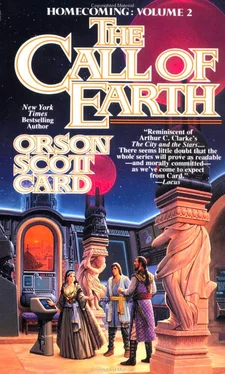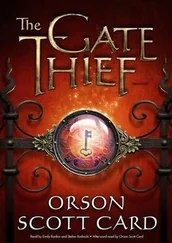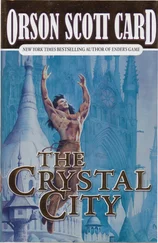Orson Card - The Call of Earth
Здесь есть возможность читать онлайн «Orson Card - The Call of Earth» весь текст электронной книги совершенно бесплатно (целиком полную версию без сокращений). В некоторых случаях можно слушать аудио, скачать через торрент в формате fb2 и присутствует краткое содержание. Жанр: Фантастика и фэнтези, на английском языке. Описание произведения, (предисловие) а так же отзывы посетителей доступны на портале библиотеки ЛибКат.
- Название:The Call of Earth
- Автор:
- Жанр:
- Год:неизвестен
- ISBN:нет данных
- Рейтинг книги:3 / 5. Голосов: 1
-
Избранное:Добавить в избранное
- Отзывы:
-
Ваша оценка:
- 60
- 1
- 2
- 3
- 4
- 5
The Call of Earth: краткое содержание, описание и аннотация
Предлагаем к чтению аннотацию, описание, краткое содержание или предисловие (зависит от того, что написал сам автор книги «The Call of Earth»). Если вы не нашли необходимую информацию о книге — напишите в комментариях, мы постараемся отыскать её.
The Call of Earth — читать онлайн бесплатно полную книгу (весь текст) целиком
Ниже представлен текст книги, разбитый по страницам. Система сохранения места последней прочитанной страницы, позволяет с удобством читать онлайн бесплатно книгу «The Call of Earth», без необходимости каждый раз заново искать на чём Вы остановились. Поставьте закладку, и сможете в любой момент перейти на страницу, на которой закончили чтение.
Интервал:
Закладка:
What was in Moozh's power to make happen? At this moment, if he sent a delegation with a sternly worded demand for the surrender of the nearest cities, they would no doubt receive quick compliance. But the refugees would gout out of those cities like blood from a heart-wound, and the other Cities of the Plain would unite then. They might even ask Seggidugu to lead them, and in that case Seggidugu might well act.
Instead he might demand Seggidugu's surrender. If they complied, then the Cities of the Plain would all roll over and play dead. But it was too big a gamble, if he could find a better way. He really could force the surrender of any one or even two of the Cities of the Plain, but he had far too few men-and far too tenuous a link with the main Gorayni armies-to make his ultimatum stick if Seggidugu decided to defy him. Great wars had been avoided, great empires had been created by just such dangerous bluffs, and Moozh was not afraid to take the chance if there was no better way.
And if there was a better way, he would have to find it soon. By now the Imperator himself would know that both Plod and the intercessor assigned to Moozh's army had been killed-by a Basilican assassin, of course, but no one had been able to question him because Moozh had killed the man with his own hands. Then Moozh took off with a thousand men and no one knew where he was. That bit of news would strike terror into the heart of the Imperator, for he knew quite well how fragile the power of a ruler is, when his best generals become too popular. The Imperator would be wondering how many of his own men would flock to Moozh if he raised a flag of rebellion in the mountains; and how many others, too loyal to defect, would nevertheless be terrified to fight against the greatest general of the Gorayni. All these fears would prompt the Imperator to put his armies in motion, and to have them moving south and west, knowing Khlam and Ulye.
All well and good... that would frighten the Seggidugu even more, and increase the chance that bluffing them into submission might work. And these army movements would not get far before the next news reached the Imperator-that Moozh's bold movement had succeeded brilliantly, that the fabled city of Basilica was now in Gorayni hands.
Moozh smiled in pleasure at the thought of how that news would strike terror in the hearts of all the courtiers who had been whispering to the Imperator that Moozh was a traitor. A traitor? A man who has the wit and courage to take a city with a thousand men? To march past two powerful enemy kingdoms and take a mountain fortress perched in their rear? What kind of traitor is this? the Imperator would ask.
But still, he would be afraid, for boldness in his generals always terrified him. Especially boldness in Vozmuzhalnoy Vozmozhno. So the Imperator would send him a legate or two-certainly an intercessor, probably a new friend, and also a couple of close and trusted family members. They would not have the authority to overrule Moozh-the Gorayni would never have conquered so many kingdoms if the imperators had allowed their underlings to countermand the orders of generals in the field. But they would have the ability to interfere, to question, to protest, to demand explanations, and to send word back to the Imperator of anything they didn't like.
When would these legates arrive? They would have to take the same desert route that Moozh had taken with his men. But now that road would be closely watched by Seggidugu and Izmennik, so there would have to be a ponderous bodyguard, and supply wagons, and many scouts and tents and all sorts of livestock. Thus the legates would have neither the desire nor the ability to move even half as quickly as Moozh's army had moved. So it would be at least a week before they arrived, probably longer. But when they came, they would have many soldiers-perhaps as many as Moozh had already brought-and these soldiers would almost certainly not be men who had fought under Moozh, men he had trained, men he could count on.
A week. Moozh had at least a week in which to set in motion the course he was going to follow. He could try his bluff against Seggidugu now, and risk deep humiliation if he was defied-the Cities of the Plain would certainly unite against him then, and he'd soon be defending Basilica from a siege. This would not lead to his ouster as general, but it would take the luster off his name, and it would put him back under the thumb of the Imperator. These last few days had been so delicious, not to have to play the games of deception and subterfuge that consumed half his life when he had to deal with a friend appointed by the Imperator, not to mention some career-advancing, meddlesome intercessor. Moozh had killed relatively few people with his own hands, but he certainly relished the memory of those deaths-the surprise on their faces, the exquisite relief that Moozh felt then. Even the necessity of killing that good soldier of Basilica, Smelost, even that did not take away the sheer joy of his new freedom.
Am I ready?
Am I ready to make the move of my life, to strike in vegeance against the Imperator in the name of Pravo Gollossa? To risk all on my ability to unite Basilica, Seggidugu, and the Cities of the Plain, along with every Gorayni soldier who will follow me and whatever support we can eke out from Potokgavan?
And if I am not ready for that, am I ready to set my neck back into the collar that the Imperator forces all his generals to wear? Am I ready to bow to the will of God's incarnation here on Harmony? Am I ready to wait years, decades for an opportunity that may never be closer than it is right now?
He knew the answer even as he asked the question. Somehow he must turn this week, this day, this hour into his opportunity, his chance to bring down the Gorayni and replace their cruel and brutal empire with a generous and democratic one, led by the Sotchitsiya, whose vengeance was long delayed but not one whit less sure for all that. Here Moozh stood with an army-a small one, but his -in the city that symbolized all that was weak and effete and cringing in the world. I longed to destroy you, Basilica, but what if instead I make you strong? What if I make you the center of the world-but a world ruled by men of power, not these weak and cringing women, these politicians and gossips and actors and singers. What if the greatest story told about Basilica was not that it was the city of women, but that it was the city of the Sotchitsiya ascendancy?
Basilica, you city of women, your husband is here for you, to master you and teach you the domestic arts that you have so long forgotten.
Moozh looked again at Bitanke's list of names. If he was looking for someone to rule Basilica in the name of the Imperator, then he would have to choose a man as consul: One of Wetchik's sons, if they could be found, or perhaps Rashgallivak himself, or some weaker man who might be propped up by Bitanke.
But if Moozh wanted to unite Basilica and the Cities of the Plain and Seggidugu as well against the Imperator, then what he needed was to become a citizen of Basilica by marriage, and to gain a place for himself at the head of the city; he needed, not a consul, but a bride.
So the names that intrigued him most were the two girls, the waterseer and the raveler. They were young- young enough that it would offend many if he married either of them, especially the waterseer-thirteen! And yet these two had the right kind of prestige, the kind that could include him in its aura if he married one or the other of them. Moozh, the great general of the Gorayni, marrying one of the most holy women of Basilica-humbling himself to enter the city as a mere husband instead of a conqueror. It would win their hearts, not just those who were already grateful to him for the peace he had imposed, but all of them, for they would see that he desired, not to conquer them, but to lead them to greatness.
Читать дальшеИнтервал:
Закладка:
Похожие книги на «The Call of Earth»
Представляем Вашему вниманию похожие книги на «The Call of Earth» списком для выбора. Мы отобрали схожую по названию и смыслу литературу в надежде предоставить читателям больше вариантов отыскать новые, интересные, ещё непрочитанные произведения.
Обсуждение, отзывы о книге «The Call of Earth» и просто собственные мнения читателей. Оставьте ваши комментарии, напишите, что Вы думаете о произведении, его смысле или главных героях. Укажите что конкретно понравилось, а что нет, и почему Вы так считаете.









